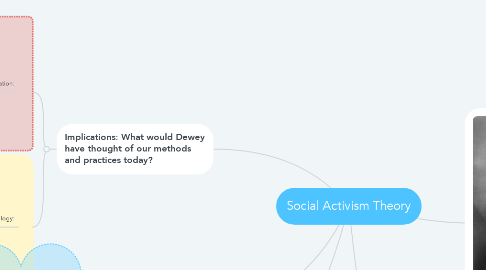
1. Implications: What would Dewey have thought of our methods and practices today?
1.1. In Education:
1.1.1. Dewey would have loved our current "interdisciplinarycurriculum and hands-on, experience based learning." (Roblyer and Hughes, p. 45)
1.1.2. Dewey would have hated our "current standards movement and the use of testing programs to determine school promotion and readiness for graduation." (Roblyer and Hughes, p. 45)
1.2. For integrating technology:
1.2.1. Dewey would have loved how the internet aids communication between students and allows them to "learn more about their society." (Roblyer and Hughes, p. 45)
1.2.1.1. He would have liked how technology aids cooperation between students
1.2.2. Dewey might have seen the difficulties in using the plethora of technological resources and "combining them into a curriculum that encourages intellectual challenge" (Roblyer and Hughes, p. 45)
2. Works Cited:
2.1. Roblyer, M.D. and Hughes, J.E. (2019) Integrating Educational Technology into Teaching: Transforming Learning Across Disciplines. New York, NY. Pearson. (p 44-45)
3. Map by Victoria Spaeth Nyce, for EDLT 525
4. Developed by John Dewey
4.1. Considered the "Grandfather of Constructivism," (Roblyer and Hughes, p. 44)
4.2. "Advocated merging absolutism and experimentalism" with constructivism. (Roblyer and Hughes, p. 44)
4.3. He was politically very liberal and an early advocate of "racial equality and women's suffrage." (Roblyer and Hughes, p. 44)
5. Principles
5.1. "Curricula should arise from student interests" (Roblyer and Hughes, p. 44)
5.2. Integrating curricula
5.2.1. Dewey that topics should be taught together to show how they were interrelated in the big picture.
5.3. Education is about personal growth, not just preparing people for specific jobs
5.3.1. Viewed "education as a way of helping individuals understand their culture and develop their relationship to society and their unique roles in it." (Roblyer and Hughes, p. 45)
5.4. "Education occurs through its connection with life" (Roblyer and Hughes, p. 45)
5.4.1. Wanted to use education to teach children to be socially conscious.
5.4.2. "All learning had to be in the context of social experience."(Roblyer and Hughes, p. 45)

